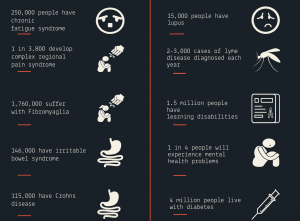7 Questions About Invisible Disabilities Answered
Invisible disabilities do not get the awareness that they deserve. Just because you can’t see it, doesn’t mean that it doesn’t exist, and unfortunately, people get judged every day for using disabled spaces or having days off work just because there is no physical problem.
What are invisible disabilities?
Invisible disabilities, also known as hidden disabilities, are disabilities that are not apparent straight away. It’s when you look at someone and they are not obviously disabled. Examples of invisible disabilities are extreme fatigue, chronic conditions and mental illnesses. Many people who suffer from hidden disabilities are able to be active in hobbies and works, however, others may struggle to get through the day. Everyone is different, and every disability affects people differently.
Tara Boon, 19, suffers from dyslexia a disorder that involves difficulty in learning to read or interpret words, letters, and other symbols, but that does not affect general intelligence.
It is upsetting to realise that my mind fails to express myself accurately. It is almost as if being trapped in a box, although you can move it is not to the full extent. Dyslexia is not obvious and is mostly overlook as laziness, but it is very difficult to complete normal, relatively simple, tasks.
How many people suffer with invisible disabilities?

How can you tell someone suffers with an invisible disability?
You can’t, that’s why they’re called invisible disabilities. There are occasions where you see someone with hearing aids on or injecting themselves but other than that, you can’t tell. The only way you can find out is if that person discloses that information. It’s completely up to that person tell you, some people are forthcoming about it and some are not. So don’t force it out of them, you just have to wait until that person is ready to tell you.
How do we know people aren’t faking their disability?
We don’t know that people are ‘faking ‘ their disability, but 99% of the time they are not. The stigma that hidden disabilities are not considered the same as physical, leads to people thinking that they are ‘faking’ their disability and that’s not fair. It makes those that suffer, have to justify what they are going through. You would never expect someone to ask a physically disabled person to prove they are disabled, so why ask someone who suffers from a hidden disability too. Never accuse someone of faking their disability because they could take great offence to that.
Many people have invisible disabilities, I wouldn't dare judge if someone was disabled by looking at them.
(I know right wing media like to pretend that millions of people fake disabilities, but that's mostly propaganda to make society view disabled people as scroungers. fyi)
— Becca Jiggens (@beccajiggens) April 8, 2018
How do people find out they have an invisible disability?
One of the most frustrating things about having an invisible disability is the lack of immediate diagnosis. It is up there with one of the most difficult things that you can go through, it can take years, and multiple diagnoses’ and if you factor in that these disabilities can develop anytime from birth to adulthood, if not later, it’s near impossible to get a diagnosis straightaway.
How should we act around someone who has an invisible disability?
You shouldn’t act any differently, they are still the same as any other human being. All you need to remember is that it may take them longer to do something, so just be patient and give them help if needed. 90% of the time, those with disabilities do not like being fussed over, just be there for them when they need you.
Thanx for being open & a strong role model @SeamusORegan Its so true, we r not broken, not disabled…but a person dealing w an invisible #disability who is still a #CapAble person. Having a person in the public eye speakup, support & share shows us we r not alone. #WeAreAllAble https://t.co/Nc7xUtE3YG
— Carol-Ann Chafe (@C_AChafe) April 17, 2018
Why should we treat someone who has an invisible disability the same as someone who has a physical disability?
Both physical and mental disabilities are difficult to have, and both can be just a debilitating as each other. Just because you can’t see someone’s disability, doesn’t mean that it doesn’t affect every aspect of their life. People with hidden disabilities have often had to adjust their lives around their disability, just like someone with a physical disability would often have too.
ME Research UK, a research organisation for Chronic Fatigue Syndrome said: “It is widely acknowledged that ME/CFS has faced significant under-investment in biomedical research over many years, both in the UK and overseas. Within the UK specifically, for example, ME/CFS receives comparatively little funding compared to other neurological disorders. MS affects about 100,000 people compared to the 250,000 estimated to have ME/CFS but has received 20 times the funding. This needs to change.”
When it comes to invisible disabilities, you never know who has them, so be kind to people. There’s no need to judge someone for parking in a disabled space, or using an accessible toilet just because you can’t see something physically wrong with them. Some people have a lot going on in their lives and are just good at hiding it.
If you see someone stand up from a wheelchair or walk from the handicap parking spot, don't jump to conclusions. Many people battle invisible illnesses & disabilities that make it hard to stand or walk for very long. Don't make assumptions about people's health. #ChronicPain pic.twitter.com/O80i7Pt2Ih
— ?Beana? (@GenaMSwarrior) April 22, 2018
Should british sign language be compulsory in schools? Click here to read more.
